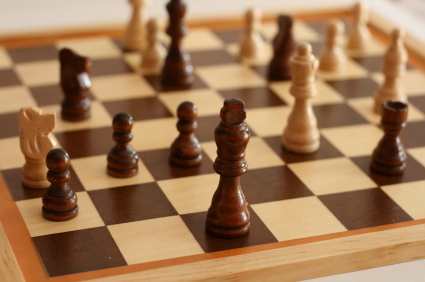

IMACS’ Senior Curriculum Developer, Edward Martin, recalls a lesson learned from his own father about the virtues of honing one’s mental agility with games, an exercise that is particularly effective for developing abstract thinking skills.
When he was in a reflective mood, my dad occasionally revealed interesting episodes from life as a younger man. He recalled, for example, for several years riding the train to work in company with two fellows who spent the hour-long journey either with eyes closed or staring into space while sporadically uttering cryptic phrases such as “D five to B six.” Puzzled by this behavior, after a few weeks my dad asked them what they were doing. It turns out that they were playing chess…without a board! The amazing thing was that they were usually able to agree upon the outcomes of these wholly-imagined contests.
Few of us are blessed with such powers of concentration. However, the ability to concentrate is something that can be trained. As with many such faculties, it improves with use. Even 8- or 9-year-old youngsters are capable of feats approaching that of my dad’s glassy-eyed chess-playing companions. Next time your energetic third or fourth grader is acting up in the car, challenge him or her to a game of tic-tac-toe…without the board. Brush aside any incredulity that such a thing is possible. Just jump in and say, “I’ll go first. I’ll be X and I’ll put my first X in the top left corner.” Before you know it, your recalcitrant fellow traveler will be caught up by the spirit of competition and will be totally focused upon the goal of putting you in your place for having the temerity to issue such a challenge.
In this quick and simple little exercise, you achieve: honing concentration skills, thinking about and communicating grid-based information, and peace and quiet. It’s a win-win situation!
What are some of the mind-stretching games that you play or played?
Have you imagined yourself taking an IMACS course? Sign up for our free aptitude test. Play along with our weekly IMACS logic puzzles on Facebook.








There are mind games you can play even before your kids learn to play certain board games. For example, on the drive to school we take turns reciting the the letters of the alphabet different ways – skipping a letter, skipping every two letters, even going backwards! The alphabet, that is, not the car. 🙂
This was not really a “game” but a way of passing time while I was getting an MRI done… I would calculate the square of two digit numbers by turning the number into a binomial and then squaring that. For example, 68 turns into (60+8)which squared (remember FOIL) is 3600+960+64 = 4624. It kept me occupied during that long hour of whirring and banging.